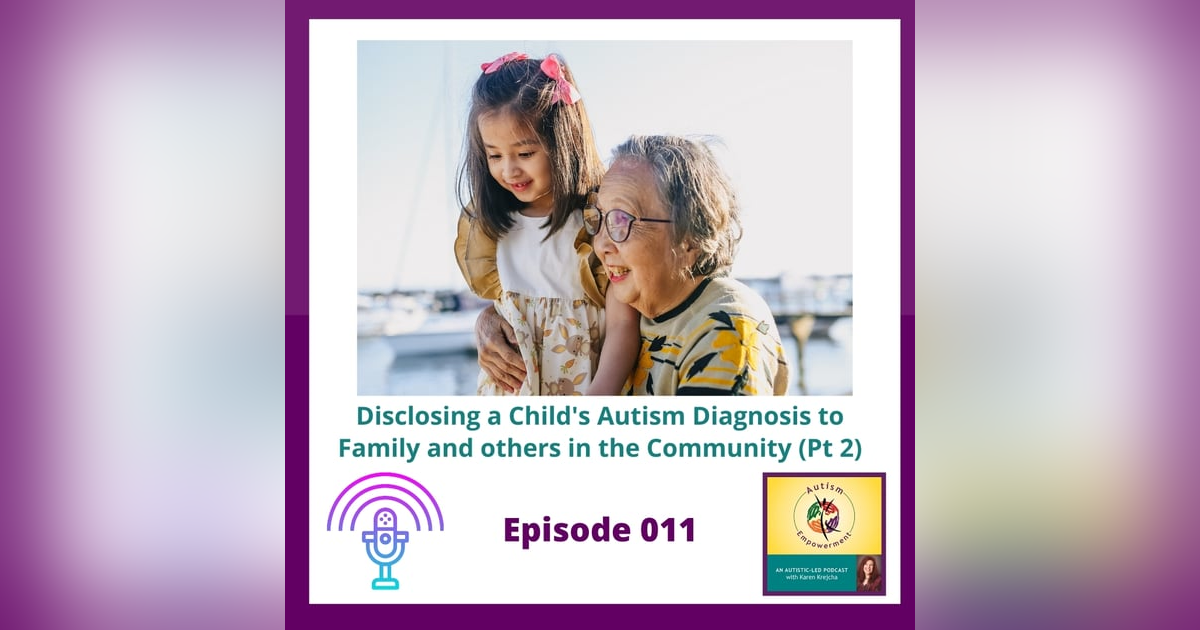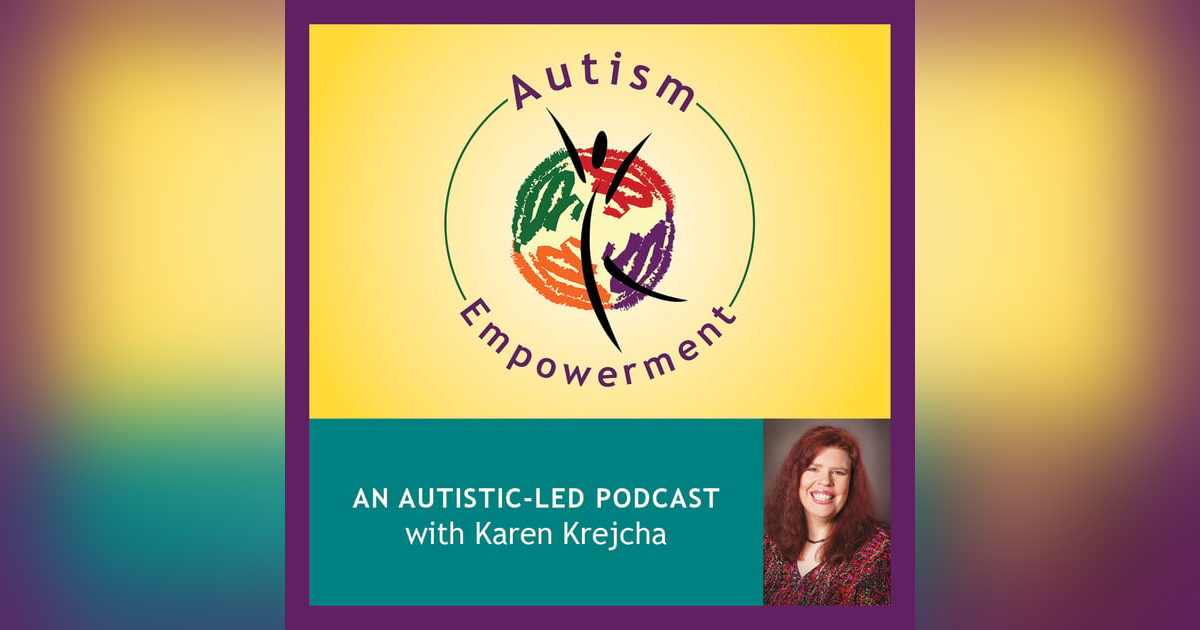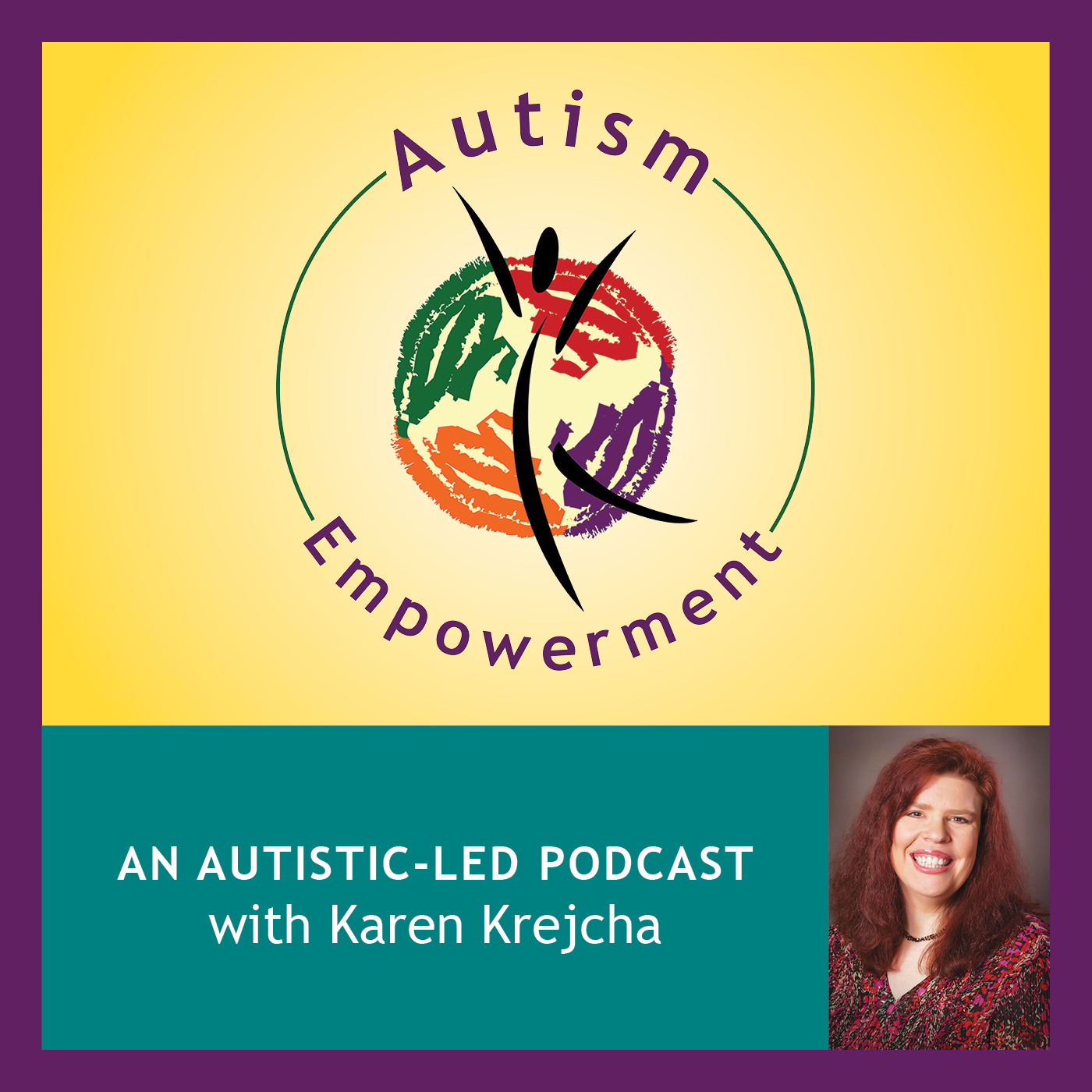Ep. 11: Disclosing a Child's Autism Diagnosis to Family and others in the Community


Today’s episode of the Autism Empowerment Podcast is Part 2 in a 3-part series on Autism Diagnosis Disclosure. We discuss reasoning and strategies in Disclosing a Child’s Autism Diagnosis to family, friends, agencies, schools, medical providers and others in the community.
Episode Title: Disclosing a Child’s Autism Diagnosis to Family Members and others in the Community
In this episode of the Autism Empowerment Podcast, we discuss thoughts on how and when to disclose a child’s autism diagnosis to family members, friends, medical providers, schools and others in the community.
This is Part 2 in a 3-part series on Autism Diagnosis Disclosure. In Episode #10, we discussed how, when and why to disclose an autism diagnosis to a child. In Episode #12, we will cover autism diagnosis disclosure for adults.
Learn from and hear anecdotes from autistic and neurodiverse adults and parents who have had over 13-years-experience disclosing autism diagnoses. Join Karen and John Krejcha from Autism Empowerment today.
The issue of disclosure is one of those topics that everyone with an autism diagnosis is going to face at some point multiple times. Who do I tell? What? When? Why? How much?
Once your child has a diagnosis of autism, one of your first questions may be, “So who do I tell?” Family? Neighbors? Agencies? Providers? The general population?”
We can’t cover every family dynamic or personal situation, so what we’re doing in this episode is giving an overview including why to tell, who to tell, common talking points, suggestions and examples that you can personalize to your own family’s needs.
In most cases, disclosure is about your autistic child being successful, respected and accepted in whatever environment they are in. Disclosure, when done in a positive and meaningful way helps to ensure that your child has their needs met by others. It also can facilitate a positive attitude toward autism on the part of others and promote autism acceptance.
When our extended families, our friends, our neighbors, and those in our community have positive, successful interactions with our children on the autism spectrum, we help to support a positive future for them that involves increased inclusion and opportunities. Our children on the spectrum are going to grow up into adults on the spectrum. The more that we can do to positively support their inclusion, independence and acceptance in society, the better for all.
Show Questions with a timestamp for Question and Answer:
Generally speaking, why tell others about your child’s autism diagnosis? (4:30)
If your child will require a level of accommodation, modification, support, service, or just patience and understanding in a certain situation, telling someone about the diagnosis can often help make this happen and may smooth things out for all involved.
There are times when full disclosure is needed.
There are times when partial disclosure will suffice.
There will be occasions when you should not disclose at all.
As parents of children on the autism spectrum, we have all been (or will be at some point) in a situation when unexpected or inappropriate behaviors associated with autism made others misunderstand, feel uncomfortable, or even judge us as parents or judge our children.
It is not necessary to tell everyone you meet or know that your child is on the autism spectrum. But if not saying anything will put your child in safety danger, in jeopardy of having a meltdown or put others at a disadvantage in interacting with your child, it is worth learning how to disclose the diagnosis effectively, proactively and compassionately to best support your child.
On a very basic level, who should you tell about your child’s autism diagnosis? (5:43)
Certain places are necessary to disclose to in order to qualify for and access autism and disability-related services and support.
- In each state, there is a Developmental Disabilities Program which is a state agency that works to support individuals with disabilities. To find your state’s intellectual and developmental disabilities agency, visit https://www.nasddds.org/state-agencies
- Medicaid (medical health care services)
- Social Security Disability Insurance Program (SSDI) - disability programs provide assistance to people with disabilities.
- Early Intervention
- Schools (Individualized Education Program services - 504 plan for accommodations)
What about disclosure to family and close family friends? (8:16)
When a parent makes a decision to disclose to an adult family member, particularly a grandparent, this may cause a lot of anxiety. How might you want to share your child’s diagnosis? (9:56)
How will the disclosure of your child’s autism diagnosis to other people potentially help your child? (16:47)
What initial and difficult reactions might you encounter with adult family members before acceptance? (24:32)
What about disclosure of an autism diagnosis to brothers or sisters? (29:42)
What if a family member comes to you and asks how they can help or be an ally? (32:48)
What about the confidentiality of information? What is the difference between HIPAA and FERPA? (36:24)
- HIPAA - Health Insurance Portability and Accountability Act of 1996 (pertains to medical records)
- FERPA - Family Educational Rights and Privacy Act (pertains to educational records)
Building relationships with teachers and navigating the school system resources are at SpectrumLife.org - Articles in Education Section
What does disclosure look like out in the community? (39:36)
What are the differences between Passive Disclosure, Reactive Disclosure and Active Disclosure? (40:42)
Related Podcasts:
- Autism Empowerment Podcast Episode 10: Disclosing an Autism Diagnosis to a Child - How, when and why to let your child know they are autistic (Series Part 1)
- Autism Empowerment Podcast Episode 12: Autism Diagnosis Disclosure for Adults - When, Why and How to Disclose Your Autism Diagnosis (Series Part 3)
Additional Resources and References related to this episode:
- WA State Developmental Disabilities Administration
- Oregon Developmental Disabilities Services
- Find your state’s intellectual and developmental disabilities (I/DD) agency.
- Benefits for children with disabilities from Social Security Administration
- Sibling Support - https://siblingsupport.org/ - The Sibling Support Project is the first national program dedicated to the lifelong and ever-changing concerns of millions of brothers and sisters of people on the autism spectrum or with special health, developmental, and mental health concerns.
- 12 Important Needs of Siblings and Tips to Address These Needs
- Spectrum Life Magazine - Educational resources
Next steps and great things to do:
- Subscribe to our show on your favorite podcast platform.
- Show us some love and support our nonprofit work with a donation.
- Like Autism Empowerment Podcast at Facebook
- Like Autism Empowerment at Facebook
- Like Spectrum Life Magazine at Facebook
- Follow us at Twitter @Podcast_Autism @AutismEmpowermt @SpectrumLifeMag
- See our LinkTree for all the latest links - https://linktr.ee/autismempowerment
Full Transcript. Click below on words to play.
There may be slight errors due to the way artificial intelligence interprets our voices. We've done some light editing. We hope this accommodation will be useful to you. Downloads are also available for free. Thank you for your support!























